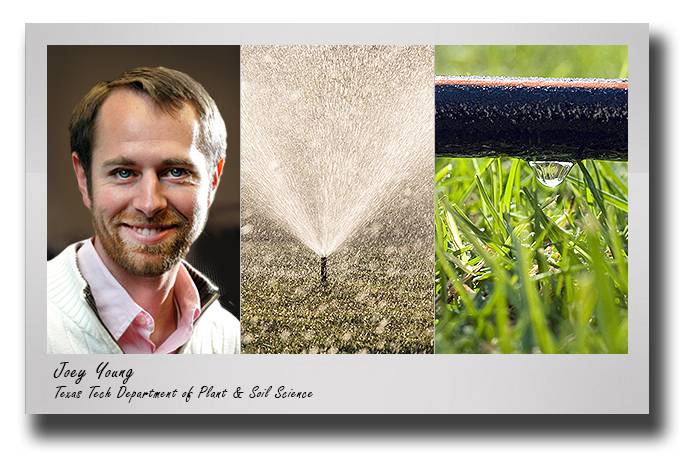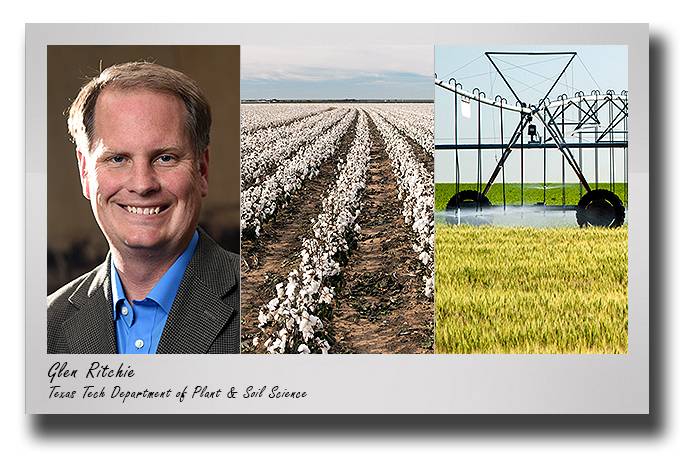Water Wise; Sweltering temperatures call for smart use of limited resources
By: Allen Ramsey
 Grueling heatwaves searing the Texas High Plains this summer call for using the right
techniques and technologies that can benefit everyone from the average homeowner looking
to maintain a lawn to the farmer looking to maximize crop output, say Texas Tech agriculture
experts.
Grueling heatwaves searing the Texas High Plains this summer call for using the right
techniques and technologies that can benefit everyone from the average homeowner looking
to maintain a lawn to the farmer looking to maximize crop output, say Texas Tech agriculture
experts.
 In terms of turf, priority one is deep and infrequent irrigation, said Joey Young, an Associate Professor of Turfgrass Science within Tech’s Department of Plant & Soil
Science. “Trying to wet the whole profile and then let it go until it starts to dry
out helps develop a deeper root system,” he said
In terms of turf, priority one is deep and infrequent irrigation, said Joey Young, an Associate Professor of Turfgrass Science within Tech’s Department of Plant & Soil
Science. “Trying to wet the whole profile and then let it go until it starts to dry
out helps develop a deeper root system,” he said
Another key in smart irrigation is making sure the water is hitting its intended target, and not being wasted as runoff onto streets and sidewalks. Using technology like irrigation controllers can be great, but using them correctly is even more important.
“One of the biggest challenges we have with irrigation controllers is a ‘set it and forget it’ mindset,” Young said. “That's probably the worst thing we can do because there's a fluctuation in how much water is needed. Having the ability to make adjustments is key.”
Investing in a rain-freeze sensors that connect to an irrigation system is a way to mitigate irrigation issues, though the sensors need monitoring in dry conditions to keep them viable. “The sensors have a small piece of cork at the very top,” Young said. “Depending on the moisture, it trips the irrigation system to where it won't run."
But with it being as dry as it is, they get brittle and aren't always effective over the long haul. There may need to be some level of consistency of updating and changing, he said. Though less cost-effective, ground sensors that measure moisture and can be connected to an irrigation system offer an even more effective means of controlling water flow.
 “The more we use the technology to do scheduling and triggering, the better off we're
going to be, and there is new research showing a good return on investment for both
of those technologies,” Young said. Texas A&M AgriLife Research Extension offers resources
to help homeowners use their equipment more efficiently, he said.
“The more we use the technology to do scheduling and triggering, the better off we're
going to be, and there is new research showing a good return on investment for both
of those technologies,” Young said. Texas A&M AgriLife Research Extension offers resources
to help homeowners use their equipment more efficiently, he said.
 Meanwhile, another Texas Tech soil science expert offers a message for producers on
the front lines of crop irrigation efficiency. West Texas has always been among the
most efficient areas regarding technology and water resources, but Glen Ritchie, Texas Tech’s J.A. Love Endowed Chair in Sustainable Agriculture, noted that poor
timing in the use of those resources is a common mistake.
Meanwhile, another Texas Tech soil science expert offers a message for producers on
the front lines of crop irrigation efficiency. West Texas has always been among the
most efficient areas regarding technology and water resources, but Glen Ritchie, Texas Tech’s J.A. Love Endowed Chair in Sustainable Agriculture, noted that poor
timing in the use of those resources is a common mistake.
“People want to give water while they have it,” he said, “and the reality is you want to give water when the plants are flowering and going into fruit production, regardless of what the row crop is.”
The use of technology like low energy precision application (LEPA) systems and subsurface drips helps maintain efficiency and improve yields from crops. “If you're running a center pivot, putting LEPA systems on it is a great way to be efficient,” said Ritchie, who also serves as Chair of Tech’s Department of Plant & Soil Science. “They allow you to put the water right down into the row; you're about 90 percent efficient with your water, so you're not losing a lot to evaporation.”
Subsurface drip is another popular technology. “With that, you're more than 95 percent efficient,” he said. “Both cost some money to invest in but you pay it back in terms of increased yields that you have with the amount of water used.”
CONTACT: Glen Ritchie, Chair, Department of Plant & Soil Science, Texas Tech University at (806) 834-4325 or glen.ritchie@ttu.edu
0728NM22
Davis College NewsCenter
-
Address
P.O. Box 42123, Lubbock, Texas 79409-2123, Dean's Office Location:Goddard Building, Room 108 -
Phone
(806)742-2808 -
Email
kris.allen@ttu.edu
